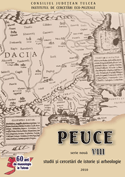Grupuri politice şi influenţa lor asupra expansiunii romane în a doua jumătate a secolului IV a.Chr. şi primele decenii ale secolului III a.Chr.
Political Groups and Their Influence on the Roman Expansion in the Second Half of the 4th century B.C. and the First Decades of the 3rd century B.C.
Author(s): Decebal NeduSubject(s): Archaeology
Published by: Institutul de Cercetari Eco-Muzeale Tulcea - Institutul de Istorie si Arheologie
Keywords: Rome; Roma; Q. Publilius Philo; App. Claudius Caecus; Q. Fabius Maximus; P. Decius Mus; M'. Curius Dentatus; Q. Fabricius Luscinus
Summary/Abstract: During the 4th century B.C., the struggle between the plebeians and the patricians gave an opportunity to many new people to involve in the public life of Rome. As a consequence of the increase in number of the political class, the competition for getting offices and military commandments became kindled. A successful political career highly depended on the number and the influence of the supporters. During the second half of the 4th century B.C. and the first decades of the 3rd century B.C., we can notice several political groups gathered around the remarkable public personalities of Rome: Q. Publilius Philo, App. Claudius Caecus, Q. Fabius Maximus and P. Decius Mus, M'. Curius Dentatus and Q. Fabricius Luscinus. The alliances formed around these personalities aimed at obtaining offices and public prestige. The literary tradition does not allow us to say that each of these groups wanted to direct the Roman expansion towards a particular region of the Italic peninsula. Although many modern studies attempted to demonstrate a long-term and a precise foreign orientation for each Roman political group, most of the reconstructions are arbitrary or speculative.
Journal: Peuce (Serie Nouă) - Studii şi cercetari de istorie şi arheologie
- Issue Year: VIII/2010
- Issue No: 8
- Page Range: 87-108
- Page Count: 22
- Language: Romanian

